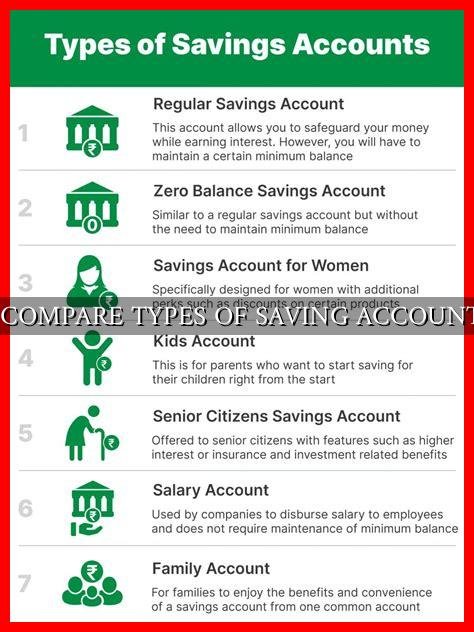-
Table of Contents
- 9 Compare Types of Saving Accounts
- 1. Traditional Savings Account
- 2. High-Yield Savings Account
- 3. Money Market Account
- 4. Certificate of Deposit (CD)
- 5.
. Individual Retirement Account (IRA)
- 6. Health Savings Account (HSA)
- 7. 529 College Savings Plan
- 8. Online Savings Account
- 9. Joint Savings Account
- Summary
9 Compare Types of Saving Accounts
When it comes to saving money, choosing the right type of savings account can make a significant difference in how much you can grow your funds over time. With so many options available, it can be overwhelming to decide which one is best for your financial goals. In this article, we will compare nine types of savings accounts to help you make an informed decision.
1. Traditional Savings Account
A traditional savings account is offered by banks and credit unions and typically pays a low interest rate on your deposits. While these accounts are safe and easy to access, they may not offer the highest returns compared to other types of savings accounts.
2. High-Yield Savings Account
High-yield savings accounts offer a higher interest rate than traditional savings accounts, allowing your money to grow faster. These accounts are usually offered by online banks and have fewer fees, making them a popular choice for savers looking to maximize their earnings.
3. Money Market Account
A money market account combines the features of a savings and checking account, offering a higher interest rate while still allowing you to write checks and make withdrawals. These accounts typically require a higher minimum balance to earn interest.
4. Certificate of Deposit (CD)
A Certificate of Deposit (CD) is a time deposit that locks in your money for a specific period, ranging from a few months to several years. In exchange for this commitment, CDs offer higher interest rates than traditional savings accounts. However, early withdrawal penalties may apply.
5. Individual Retirement Account (IRA)
An Individual Retirement Account (IRA) is a tax-advantaged savings account designed for retirement savings. There are two main types of IRAs: Traditional IRAs, where contributions may be tax-deductible, and Roth IRAs, where withdrawals in retirement are tax-free.
6. Health Savings Account (HSA)
A Health Savings Account (HSA) is a tax-advantaged savings account that allows you to save for medical expenses. Contributions to an HSA are tax-deductible, and withdrawals for qualified medical expenses are tax-free. HSAs are only available to individuals with a high-deductible health plan.
7. 529 College Savings Plan
A 529 College Savings Plan is a tax-advantaged savings account designed to help families save for future education expenses. These accounts offer investment options to grow your savings over time, and withdrawals for qualified education expenses are tax-free.
8. Online Savings Account
An online savings account is a type of savings account that is managed entirely online, without the need for physical branches. These accounts often offer higher interest rates and lower fees compared to traditional savings accounts, making them a convenient option for savers who prefer digital banking.
9. Joint Savings Account
A joint savings account is a shared account between two or more individuals, allowing them to pool their resources and save together. This type of account can be beneficial for couples, family members, or business partners who want to work towards a common financial goal.
Summary
Choosing the right type of savings account is crucial for achieving your financial goals. Whether you prioritize high interest rates, tax advantages, or flexibility in accessing your funds, there is a savings account that fits your needs. By comparing the nine types of savings accounts outlined in this article, you can make an informed decision that aligns with your financial objectives.
Remember to consider factors such as interest rates, fees, minimum balance requirements, and tax implications when selecting a savings account. By doing your research and understanding the different options available, you can make the most of your savings and secure your financial future.





